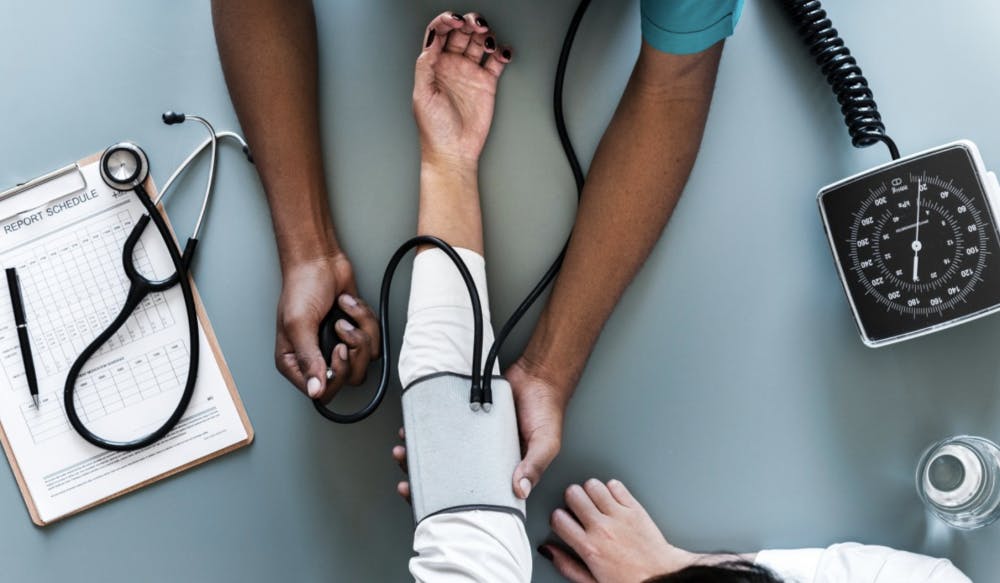From interacting with patients to collaborating with colleagues, coupled with the intensity of a hospital environment while being a full-time student, an aspiring healthcare professional faces a plethora of challenges.
Inspired by Diversi-Tea — an informal chat series co-sponsored by the University’s Multicultural Student Center and Career Center that allows students to discuss their personal identities with respect to their prospective careers — the Career Center sought to answer how these challenges are influenced by a medical student’s diverse background or identity.
In the Newcomb Hall Gallery Tuesday evening, a panel of four students in the School of Medicine shared how their diverse identities influenced their experiences as aspiring healthcare professionals. The panel, called “Crucial Career Conversations: Identity, Diversity & Medicine,” consisted of Medical students Corey Benjamin, Lois Davis, Bijan Morshedi and Anthony Wiggins.
The coordinator of the event, Sarah Bessey, a pre-health and law advisor at the Career Center, said that she was compelled to host this panel to create a casual dialogue for any students that identified with underrepresented groups in healthcare.
“I just wanted to ... get students engaged and to feel comfortable, confident and empowered in their own identities within healthcare, and hoping that having kind of near, peer [medical] students be someone they could see themselves in,” Bessey said.
Race, gender and ethnicity often come to mind when considering diversity. However, Davis shared how her socioeconomic status is a crucial component of her identity.
“I come from a very low-income family,” she said. “I learned the art of hustling early and getting money however there was a means to get money, so I started doing hair at 11.”
Davis said that throughout her life, she always needed to be cognizant of how she was managing her finances. According to Davis, as a medical student with enough physically and emotionally draining responsibilities, financial issues shouldn’t have to be an additional stress factor, yet this is a reality for her and many other students who might share her narrative.
Race had an immense influence on each of the students’ experiences as well. Wiggins shared how he felt being a black man was an obstacle while navigating such an academically daunting field.
“It can be difficult just to feel doubted, for my classmates to think maybe I didn’t score as well or maybe I didn’t get as good as [recommendations], but I’m here because I’m black, or whatever the case may be,” he said.
Wiggins advocated that while it may be exhausting to constantly try to justify one’s worth, one should always seek to use that hunger and drive to their advantage.
“There are going to be plenty of people out there that can and will doubt you along the way, and you don’t have to be one of them,” Wiggins said.
In response to Wiggins, Davis discussed how her identity as a black woman was regarded positively.
“Of course, the challenges are important, but it’s not always going to be a negative experience,” she said. “When I walk in and there’s a black patient, they’re so excited, they’re immediately extended family. A lot of times for them, it’s the first time they’ve seen someone that looks like them wearing a white coat.”
Additionally, Morshedi, who is of Argentinian and Iranian descent, shared his experience being biracial. Morshedi revealed that this duality served as both an asset and a challenge, as sometimes his identity was only half regarded and became muddled particularly when a patient generalized him as one ethnicity over the other.
“People are kind of surprised with me when I can start speaking Spanish with a patient,” Morshedi said. “They might say, ‘Oh, [you] don’t look hispanic.’ The people who are from the Middle East will want to wrap that side of my [culture] into their experience with me.”
Benjamin, a first-generation college student of Liberian and Haitian descent, closed with a personal statement that he directed to anyone who might be struggling with accepting their identity.
“Being unique and embracing your identity has been overall an asset for me,” he said. “I wish I would have recognized that sooner and not been afraid to be who I am.”
After the discussion, fourth-year College student Allyson Sloan said that she gained a lot from the panel regarding what it means to be diverse and defining your identity.
“It encouraged me to investigate some of the parts of myself that didn’t necessarily have to do with race, which I thought was really valuable because that’s only one part of a person,” she said.
Benjamin, who is also the liaison between the Career Center and the School of Medicine’s Student National Medical Association — an independent organization focused on representing medical students of color — plans to maintain connections with the University’s undergraduate pre-medicine students. He and the Career Center seek to provide students who identify with an underrepresented group with opportunities to learn and connect with similar individuals who have successfully navigated the system despite the inevitable hurdles along the way.
Correction: The previous version of this article did not include the entirety of Davis's quote, and has been updated to reflect her whole statement.







